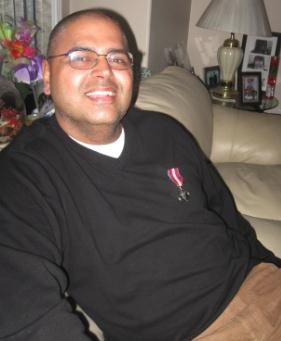“To me, getting this medal is about recognizing ordinary people who are making a difference in their community,” says Alex Sangha, who received a Queen’s Diamond Jubilee medal Feb 10 for his volunteerism and dedication to creating safe spaces for queer people of colour.
“My sole purpose in life is not to have a good job or a high education or make tons of money. For me, it’s about building relationships, friendships and making a difference in people’s lives,” he says.
“I feel that a lot of people who do social work, community service and volunteerism are under-appreciated in our society,” he says. “They improve our social well-being, they improve our quality of life, and why not celebrate that? If we don’t celebrate it we’re not going to appreciate it.”
Sangha, 40, is the founder of Sher Vancouver, a 450-member social, cultural and support organization for queer South Asians and their friends, families and allies. Sangha, who is gay and Indo-Canadian, started the organization in 2008 as a safety net for gay immigrants alienated from their families and struggling with their sexuality.
“It all got me so depressed, and I didn’t want to see this stuff happening anymore, especially in my Sikh community, where it is so taboo to be gay,” he says.
Sangha admits he faced criticism from some members of his Indo-Canadian community about the group. “When I started Sher Vancouver, the leader of the Sikh temple was saying that there was no such thing as gay Sikhs.
“It’s getting better now,” he adds. “We’ve been active in social justice and speaking out and going into the community to try to change attitudes.”
But Sangha says more must be done.
“We are still trying to get to that stage where we are not treated differently because of our differences,” he says. “Visible minorities have experienced discrimination themselves; they should not now turn around and do the same to gays and lesbians.”
Sangha says the best way to combat homophobia is by educating all families so they can support their queer relatives and by teaching anti-homophobia in schools.
Newton-North Delta MP Jinny Sims, who presented the medal to Sangha, agrees.
“Many in the South Asian community struggle with coming to terms when a gay or lesbian individual comes out. However, through the process of education there is growing awareness and the willingness to discuss issues of homophobia and sexual orientation. There is much that needs to be done in diverse communities to address gender and sexual orientation,” Sims says.
“Family support plays a key role in this process, as does having role medals like Alex,” she says. “I have always been impressed with Alex’s positive attitude and his courage and activism. All this has earned him the respect of the community.”
In addition to Sher, Sangha launched the Dosti project in 2009 to present workshops to Lower Mainland students about what it means to be multicultural and gay. Now he is trying to bring together the resources to build Dignity House, affordable housing for queer seniors and their allies.
“Alex’s volunteer work and the initiatives he has taken to create new organizations aimed at working against homophobia, racism and bullying made him stand out,” Sim’s spokesperson, Laurie MacLean, tells Xtra.
“Jinny wanted to recognize both the important work that he has done to promote acceptance and fight homophobia, but also the other volunteer work that he does around bullying, mental health and seniors’ issues. He was an easy decision to make because his volunteer work has been so extensive and so valuable,” MacLean says.
“His identity as an out gay man is part of the work he does and part of the reason he was recognized,” she adds.
According to MacLean, Sims received close to 250 nominations from both individuals and community groups in her riding.
Sangha is dedicating his medal to his friend and Sher colleague January Marie Lapuz, a transgender woman who was stabbed to death last fall in New Westminster.
“She was basically transgender royalty within our social circle,” Sangha says.
“She didn’t judge anyone, and she really opened up the organization to people of all different backgrounds, abilities, identities and sexualities,” he adds. “She was someone that I had a great deal of respect for.”

 Why you can trust Xtra
Why you can trust Xtra


